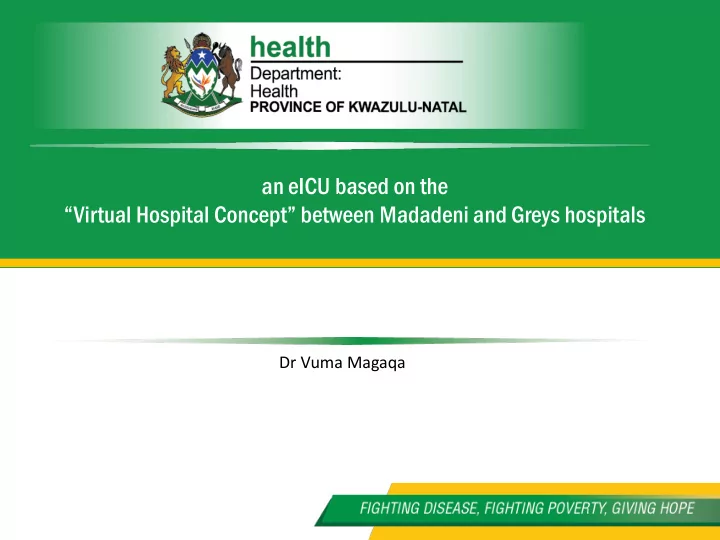

an eICU based on the “Virtual Hospital Concept” between Madadeni and Greys hospitals Dr Vuma Magaqa
Introduction The Intensive Care Units (ICUs) ideally should be managed by Specialist Intensivists. The challenge that we are facing regularly is that the quality of service is being compromised. The patients that require specialist intensivist support are being managed by medical officers. Options available at present are as follows: • Either the patient is being transported by road or by air ambulance to Greys hospital (Regional referral hospital), and • Either the Specialists (Intensivist) from Greys hospital, provides telephonic advice or they fly by Aero-medical Services (AMS) once every 2 weeks to visit the ICU at Madadeni Hospital (the hospitals are 230kms apart). 2
Background eICU innovation came into being. • an “ eICU ” project based on the Virtual Hospital Concept enables doctors and nurses to consult with the Specialist Intensivist based at Greys hospital in real-time. The specialists are in a position to have tele-video consultation with doctors and nurses who are managing the ICUs at Madadeni. • This solution alleviates the problem of having a Specialist Intensivist in every rural hospital and prevent unnecessary and avoidable transfers between our ICU’s. The solution assists in saving lives and in the process benefit the Department in improving the quality of care provided to our citizens. Furthermore, this project is a cost saving benefit to the Department. 3
The process involved is as follows: • A clinical workstation equipped with a high definition clinical grade monitor, web camera, and digital medical devices is wheeled from bed to bed in the ICU at Madadeni hospital; • The Specialist Intensivist based at ICU at Grey’s Hospital can view the patient lying in bed, review the vital signs on the bedside monitor and give advice in real-time to the medical officers and nurses who are managing the patient; and • Instead of the Specialist round every 2 weeks, the Specialist with the help of technology are able to have daily virtual rounds, sometimes twice daily based on the severity of the clinical condition of the patients. 4
• A successful pilot was conducted between the intensivist doctors at Greys Hospital ICU and the medical officers in charge of ICU Madadeni Hospital; and • The project received: ✓ MASEA 2017 gold award, ✓ First Runner at CPSI Award in 2018, ✓ GEMS Health Award CPSI Award in 2018, ✓ 2 nd Best Innovation Award in Citizen-Centred Service Delivery in Africa 5
• 6
Benefits… 1. Benefits to Patients • Improved patient satisfaction; 43 patients have benefited from the system; • The patient gets immediate attention and access to specialist care, closer to home thereby improving quality of service provided and improved patient satisfaction; • Patients do not have to be transported from Newcastle to Pietermaritzburg (distance of 275 kilometres in an ambulance; and • Relatives do not have to travel to meet their loved ones. 7
Benefits… 2. Benefits to ICU staff including doctors and nurses • This improves quality of service to the critically ill patients and supporting the medical officers who get specialist advice in real-time, thereby improving provider satisfaction and prevent professional isolation (for the young inexperienced doctors) in the process; and • The doctors and nurses based at Madadeni Hospital have access to specialist support daily at a fixed time and in an emergency in real time (when required). 8
Benefits… 3. Specialists Intensivists based at Greys • Provider satisfaction as specialists; • The Specialist Intensivist can be in their consulting rooms and still provide Specialist support to health care practitioners managing the rural hospitals; • Give advice in real time assisting the medical officers to manage the critically ill patients; 9
Benefits… 4. Specialists Intensivists based at Greys • Discuss with doctors and nurses about the treatment given to the patient; • View X-rays/ECG check bed side monitors for vital signs; and • Talk to patients if required. 10
Benefits…. 5. Benefits to the Department • Quality of service improved by provision of access to specialist to a ICU patients at a rural hospital; • Cost savings by not transporting the patients by advanced life support ambulance (approximately R19,594 per day); and • By not transporting Specialist Intensivists from Pietermaritzburg to Newcastle by air ambulance (approximately R19,780 per day). 11
12
Thank You 13
Recommend
More recommend